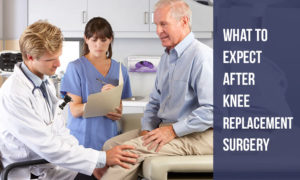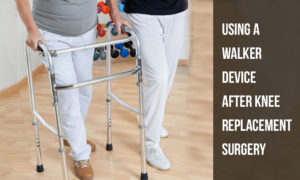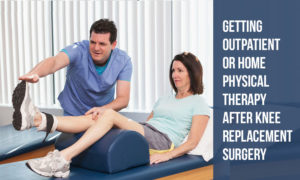What To Expect After Total Knee Joint Replacement Surgery and Hospital Discharge Expectations
 The medical world has come a long way when it comes to innovative methods for optimal joint replacements. Current and anticipated patients are absolutely amazed at how fast recovery can be when surgery goes smoothly, especially for a knee replacement. However, it is important for an older adult to understand that a joint replacement is still major surgery and that a recovery period should be expected.
The medical world has come a long way when it comes to innovative methods for optimal joint replacements. Current and anticipated patients are absolutely amazed at how fast recovery can be when surgery goes smoothly, especially for a knee replacement. However, it is important for an older adult to understand that a joint replacement is still major surgery and that a recovery period should be expected.
So the fair questions are, “What should I expect? How long will it take for my knee to heal? How much help will I need at home? What activities can I do or not do? What if there are complications and what will those look like? Am I going to have to buy medical equipment like a walker or something?” The following bullet points provide brief answers:
- Recovery Time: From the day you leave the hospital to the day you begin your normal routine of activities at home again, the time-frame is usually anywhere from 3 to 6 weeks for full recovery. If you had both knees done at the same time, it could take longer because your mobility is more limited. While in the hospital, you can be expected to walk with a physical therapist using a walker just a few hours after surgery. You will be allowed to shower within two days, but soaking in baths and applying lotions will have to wait until the staples are removed which is usually about 2 weeks out.
- Movement Precautions: As previously mentioned, you will most likely be walking just a few hours
 after leaving the operation room. Your doctor will typically let you put as much as weight through your operative knee as you can (i.e. weight-bearing as tolerated). Within a couple of days, you’ll be regularly walking, performing ankle pumps in a seated position, and possibly trying a short flight of practice stairs in therapy. You do not want to over bend or move the joint too quickly to cause pain, but you can expect some discomfort as you recover. Walking every couple of hours with a walker or crutches at home is highly recommended, but so is rest.
after leaving the operation room. Your doctor will typically let you put as much as weight through your operative knee as you can (i.e. weight-bearing as tolerated). Within a couple of days, you’ll be regularly walking, performing ankle pumps in a seated position, and possibly trying a short flight of practice stairs in therapy. You do not want to over bend or move the joint too quickly to cause pain, but you can expect some discomfort as you recover. Walking every couple of hours with a walker or crutches at home is highly recommended, but so is rest.
- Family or Caregiver Assistance: This is especially important for older adults who already had balance problems or muscular weakness prior to surgery. Make sure you have a family member or other caregiver available to you for a couple of weeks after surgery. You will need someone to assist you with driving, possibly getting off and on low seats, transferring in and out of bed, etc. Everyone is different and will need various levels of assistance for daily living tasks, but play it safe and have someone in mind to help you.
- Outpatient or Home Health Therapy Exercises: Consult with your doctor prior to leaving the hospital abou
 t what the best rehabilitation options would be to maintain movement and exercise after leaving the hospital. Many doctors will suggest outpatient physical therapy services to facilitate walking and increased bending (flexion) of the knee. In some instances, especially elderly persons who already struggle with leaving their homes, home health therapy is appropriate. Your physical and/or occupational therapist will set you up with exercises that increase walking daily, encourage flexion of the operative knee, and reduce the risk for blood clots or other circulatory issues.
t what the best rehabilitation options would be to maintain movement and exercise after leaving the hospital. Many doctors will suggest outpatient physical therapy services to facilitate walking and increased bending (flexion) of the knee. In some instances, especially elderly persons who already struggle with leaving their homes, home health therapy is appropriate. Your physical and/or occupational therapist will set you up with exercises that increase walking daily, encourage flexion of the operative knee, and reduce the risk for blood clots or other circulatory issues.
- Equipment needs: Your doctor and physical therapist will work together with you to set you up with crutches or with a walker before you go home (if you don’t have those at home already). Other pieces of adaptive equipment that have proven useful for knee patients are toilet risers, shower chairs, dressing sticks, reachers, shoe horns, and sock-aids. For an older adult who already had trouble standing up from low seats before, toilet risers are worth exploring.If you have a loved one at home who will help you with lower-body dressing, you can save some money and avoid purchasing dressing equipment. This really depends on the patient’s preferences for home.
Summary:
So hopefully this gives you a little insight into the expectations following a post-operative knee joint replacement surgery. Preparation, before having the procedure done and having a plan in place after your recovery period, will ensure things go as smoothly as possible while you return to functional independence at home.

Comments ( 2 )
Hello Steele,
Great idea to stay with your dad after surgery. The first few days are usually the hardest. Trying to get out of bed. Going to the bathroom to shower and do ADL’s.
The biggest challenge will be going up and down stairs if there are any. However most hospitals or outpatient surgery centers send patients home with physical therapy so after a few weeks. He should return to normal activities of living provided there were no other complications or health issues.
Thanks for pointing out that after joint replacement surgery you should make sure you have a family member or other caregiver available to you for a couple of weeks after surgery. My dad is thinking about getting joint replacement surgery for one of his knees because all his running over the years have kind of worn it down. If he does have the surgery I’ll have to make sure that me or my sisters can be there with him for the next couple of weeks after to make sure that he is healing well and is getting around ok.